Maths
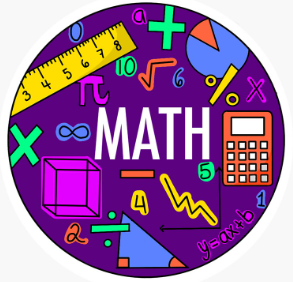
Intent
Our intent for mathematics at Nottingham Academy Primary is to promote great learning and development amongst all pupils. We aim to ensure that good progress and standards of achievement are high for all pupils.
We aim to teach a rich, balanced and progressive curriculum using maths to reason, problem solve and develop fluent conceptual understanding in each area. Our curriculum allows children to make better sense of the world around them by making connections between mathematics and everyday life. Our policies, resources and schemes support our vision and clearly outline where maths can be incorporated across different curriculum areas.
We aim to ensure that mathematics is a high-profile subject which all children view positively. We want them to be passionate and enjoy learning mathematics, which comes through a growing belief in their own ability to achieve success in the challenges they undertake. We want all children to develop a resilient, determined attitude and become independent learners that are ready to progress to the next stage of their learning.
We aim for all pupils to:
- Become fluent in the fundamentals of mathematics so that they develop conceptual understanding and the ability to recall and apply knowledge rapidly and accurately.
- Be able to solve problems by applying their mathematics to a variety of problems with increasing sophistication, including in unfamiliar contexts and to model real-life scenarios.
- Reason mathematically by following a line of enquiry and developing and presenting a justification, argument or proof using mathematical language.
- Have an appreciation of number and number operations, which enables mental calculations and written procedures to be performed efficiently, fluently and accurately to be successful in mathematics.
Implementation
Our whole curriculum is shaped by our school vision, which aims to enable all children, regardless of their background, ability and additional needs, to flourish and become confident and motivated learners.
Our curriculum is frequently reviewed to ensure that it is current and effective. Teachers are supported and aided in their teaching of mathematics through appropriate, high quality and regular CPD, ensuring confidence in the skills and knowledge that they need to teach. CPD is provided by the subject leader, external courses and from a teaching and learning consultant for mathematics. All staff are encouraged to raise questions, seek support and request further training if needed in order to ensure all teachers' subject knowledge is to a high standard. Good practice is always shared between staff and all CPD is used to inform teaching and learning in school.
The structure of the mathematics curriculum across school shows clear progression in line with age-related expectations. Teaching curriculum content in blocks allows children to explore skills and knowledge in depth and gain a secure understanding of a particular concept. Key knowledge and skills are also revisited regularly, allowing repetition to embed learning. A concrete, pictorial, abstract approach provides children with a clear structure in which they can develop their depth of understanding of mathematical concepts. Our Calculation Policy is used consistently across the school and provides sequential building of knowledge and skills in using and applying the four operations.
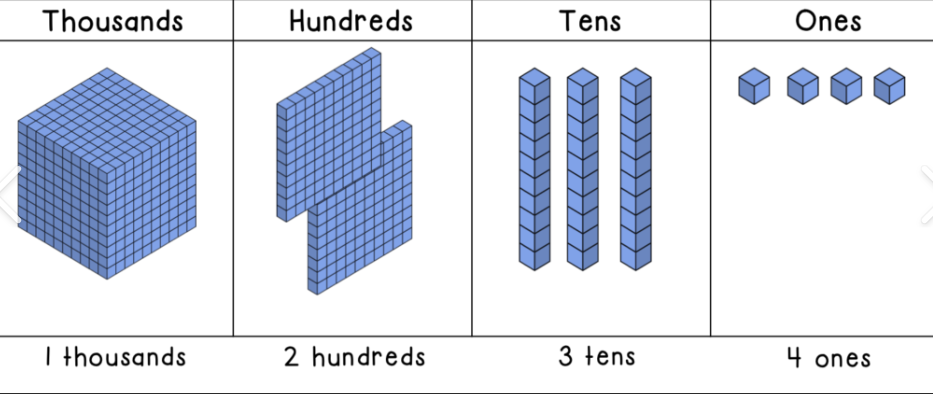
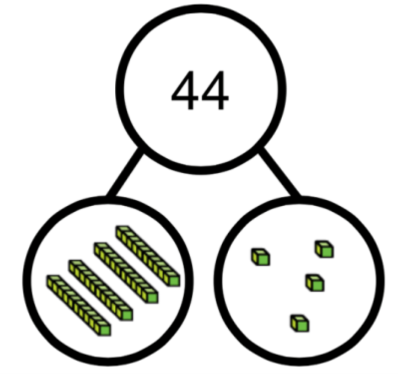
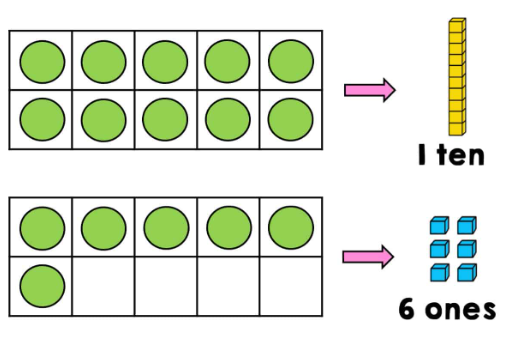
Quality First Teaching and Maths Mastery are teaching and learning approaches that we use within a whole class teaching approach. We believe all children have the potential to succeed, and they should therefore have access to the same curriculum content. If at any point a pupil is struggling with a procedure, teachers will revert to concrete and/or pictorial resources and representations to solidify their understanding or revisit the previous year’s strategy.
Children’s progress is carefully tracked and monitored through a range of assessment strategies, including the use of PiXL tests in KS1 and KS2 to ensure teachers identify where children require support to assist their progress. Timely interventions are provided by the class teacher to address any misconceptions or gaps in understanding, enabling children to confidently progress towards their next lesson. More confident mathematicians are challenged to show their mastery of maths concepts through investigations and problem-solving tasks.
At Nottingham Academy, we have designed our 9 Principles of teaching and learning. These principles are evidence informed and ensure that our teaching is of the highest quality, not only in maths, but across all areas of the curriculum. Our 9 Principles are summarised below:
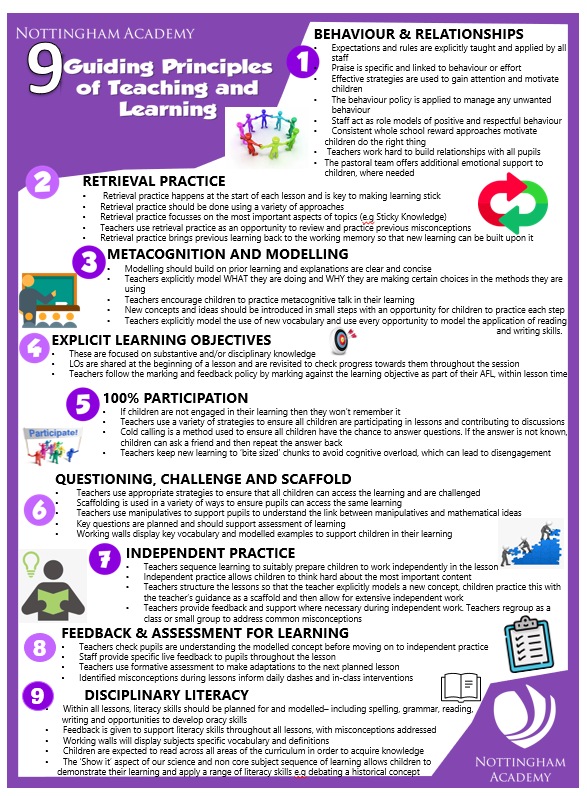
Years 1-6 lessons are supported using White Rose Maths (WRM) to ensure consistency with approaches, methods, coverage and encompasses the aims and content of the new curriculum. Alongside the White Rose materials, we use many other resources to ensure that our offer is rich and varied. These include NCETM, NRich, PiXL and Testbase. White Rose is used as a resource for teaching and learning within primary and secondary ,this ensures that there is a clear progression between both phases.
Children are taught Mathematics for approximately 1 hour daily. In addition to this, we also have daily reasoning to further children's conceptual understanding of problem-solving tasks. These are often taken after looking at areas for development from summative assessment or as an opportunity to address misconceptions or to deepen understanding in the area of maths being taught at that time.
Teachers of the Early Years foundation stage (EYFS), base their teaching on objectives from the statutory framework for the EYFS, GAT Early Years Skills Progression and WRM ensuring that they are working towards the ‘Early Learning Goals for Mathematical Development’. Children are taught mathematics for approximately 20-30 mins but then apply what they have learnt throughout continuous provision. All adults within EYFS take observations of the children applying their learning through play and ensure they provide high quality interactions to model, scaffold and extend mathematical vocabulary and concepts.
The National Curriculum is explicit in articulating the importance of children using the correct mathematical language as a central part of their learning (reasoning). New vocabulary is introduced in a suitable context (for example, with relevant, real objects, apparatus, pictures of diagrams) and explained carefully. High expectations of the mathematical language used are essential, with teachers only accepting what is correct. Vocabulary is displayed clearly on working walls and is referred to in every lesson.
We are committed to supporting all learners, including those with Special Educational Needs and Disabilities (SEND). Our approach emphasises quality first teaching and is underpinned by the mastery maths approach, which is supported by the 5 big ideas (representation and structure, fluency, mathematical thinking, variation and coherence). At our school, we meticulously structure our planning to ensure it is layered and progresses in small, logical steps which breaks down learning into manageable chunks, preventing cognitive overload. Further information around how we scaffold maths lessons and make adaptations for our SEND pupils can be found by following the link below.
Progression from Primary to Secondary:
Progression and sequencing of mathematics between primary and secondary is purposefully bridged and mapped across the complementary primary and secondary White Rose curriculum. Through a consistent mastery approach, with Concrete Pictorial Abstract strategies taught and applied throughout the curriculum, pupils benefit from a seamless transition through each phase of their journey in mathematics. Both primary and secondary White Rose progression documents can be found by following the links below.
Maths Enrichment:
At Nottingham Academy, we take every opportunity to make learning fun, relevant and exciting. This includes taking part in TTRS day, where the children dress as rock stars and enjoy lots of engaging games and activities aimed at promoting their timetable knowledge:
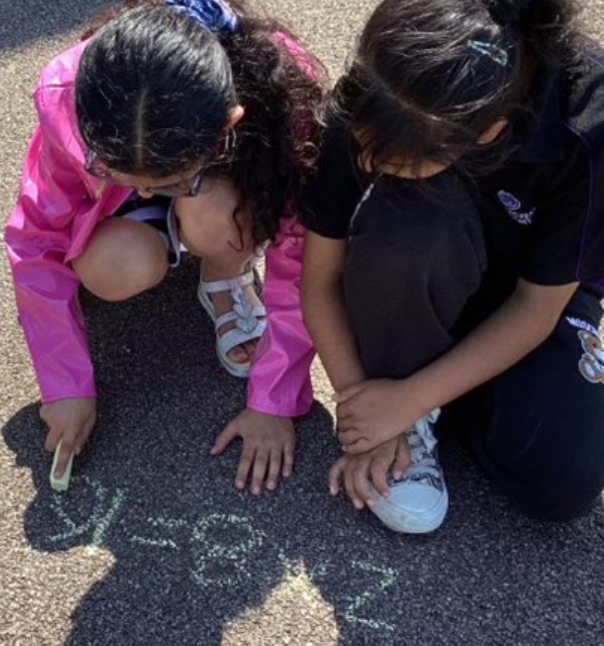
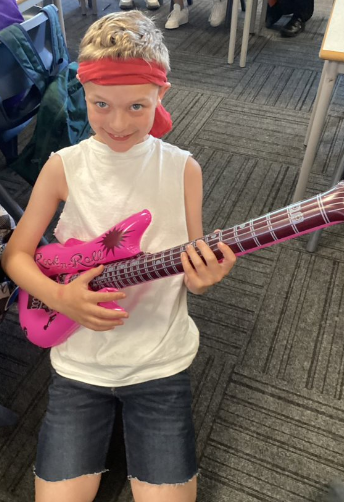


Children enjoyed taking part in the NSPCC number day, where they came to school dressed in something with numbers on. All classes took part in a race to save Buddy mathematical problems in order to find parts of the key- it was a very tense race to save Buddy first! Our parents joined us to do some baking, helping the children to understand how numbers feature in many aspects of life, including following a recipe.
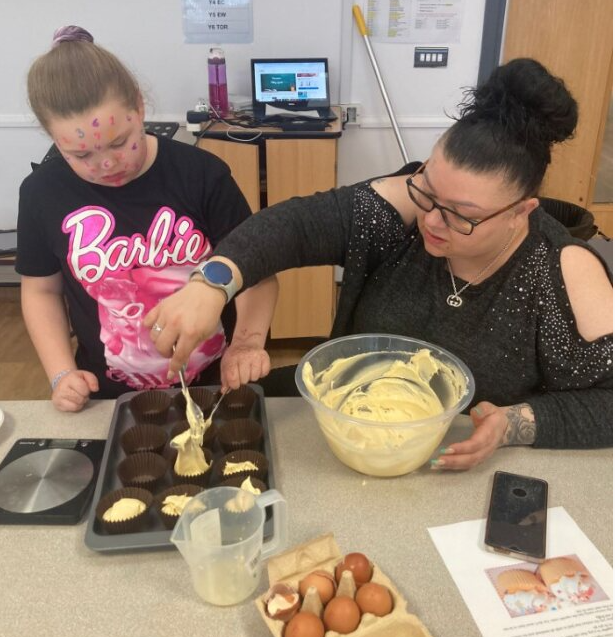
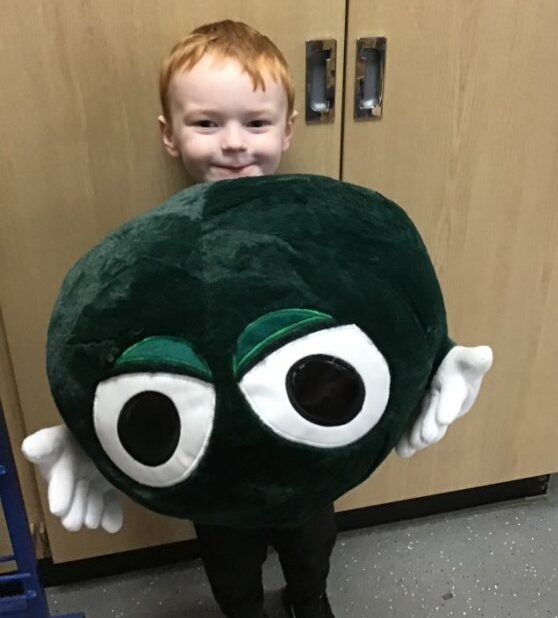
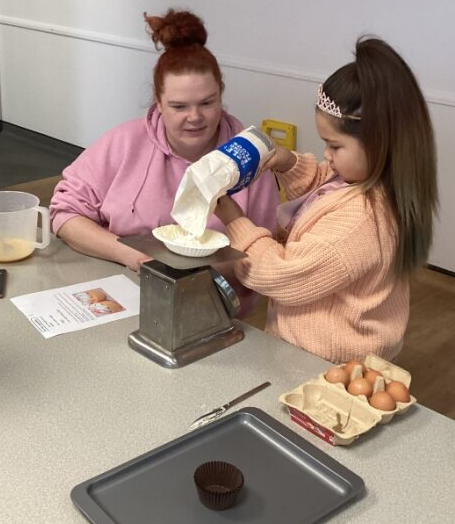

Times tables implementation:
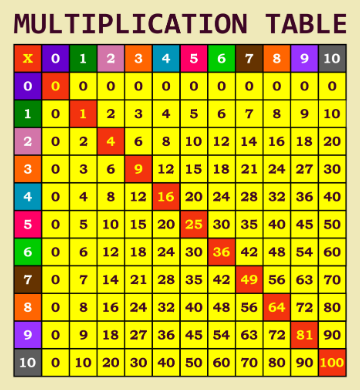

- Children will complete weekly times tables test before the weekly arithmetic tests.
- Test scores will be collected and monitored twice termly to ensure children are making good progress.
- Weekly times tables homework will be set on Times Tables Rock Stars (TTRS) to encourage all children to practice at home.
- Children have a regular opportunity to access TTRS within school.
Rewards to encourage and maintain engagement levels
- Each week, children who complete their homework will receive 2 behaviour points.
- An update on the interclass TTRS competition will feature in assemblies regularly to raise the profile of times tables across school.
- The top 3 classes in the school will be awarded with a prize at the end of term.
- The top 2 children from each class will also get a reward.
- Rock status certificates will be awarded at the end of each half term.
- The long-term plan for the teaching of times tables across school, can be found in the links below.
Impact
The impact of our mathematics curriculum is that children understand the relevance and importance of what they are learning in relation to real world concepts. Children know that maths is a vital life skill that they will rely on in many areas of their daily life. School leaders work in conjunction with each other to ensure that mathematical concepts can be revisited and practised in other curriculum areas. The opportunities for cross-curricular links are clearly evident in our bespoke progression maps.
Children have a positive view of maths due to learning in an environment where maths is promoted as being an exciting and enjoyable subject in which they can investigate and ask questions. Children know that it is reasonable to make mistakes because this can strengthen their learning through the journey to finding an answer.
Children are confident to ‘have a go’ and choose the equipment they need to help them to learn along with the strategies they think are best suited to each problem. Our children have a good understanding of their strengths and targets for development in maths and what they need to do to improve.
Our maths books evidence work of a high standard in which children clearly take pride; the components of the teaching sequences demonstrate good coverage of fluency, reasoning and problem-solving.
Our feedback and interventions support children to strive to be the best mathematicians they can be, ensuring our children are on track or above. They make good progress as measured from their individual starting points and the age-related expectations of the National Curriculum.
Our vigorous use of PiXL tests in KS1 and KS2 evidence how precise knowledge gaps are successfully identified and targeted in maths lessons in order to ensure children’s next steps are met. Our robust tracking of weekly arithmetic scores outlines the progress the children make and supports identifying common errors and misconceptions. This ensures that teaching is continually informed by assessment.
The impact of our mastery approach and emphasis on the teaching of mathematical vocabulary is evident through class/ pupil discussions and within the classroom environment.
Our carefully sequenced maths curriculum is outlined in our long-term plans, which can be found by following the link below.
Our calculation policy which details our approach to teaching key mathematical concepts in each year group can also be found by following the links below.
